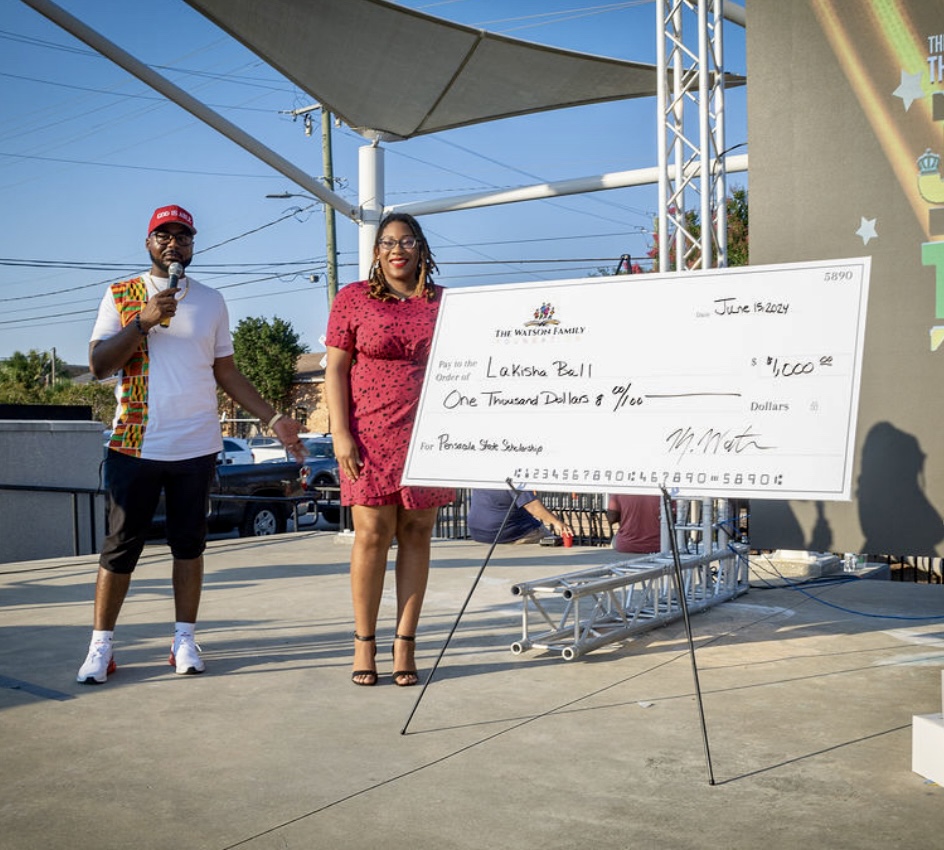
Lakisha Ball

Scholarship winners
Lakisha Ball writes essay on local civil rights icon
Pensacola State student Lakisha Ball won the Watson Family Foundation Juneteenth Scholarship.
Ball, a nontraditional student majoring in business management, wrote a 462-word essay on the Rev. H.K. Matthews to win the $1,000 scholarship. A native of Pensacola, Ball said she chose Rev. Matthews because of his legacy in the civil rights movement.
“Rev. Matthews has accomplished a lot during his lifetime. He went to jail many times and faced a lot of adversity but stands on his own as a monumental figure during the civil rights era,” Ball said of Matthews, who is now 96 and is revered as a leader, minister, and educator.
Ball, a mother of two sons – Christian, 16, and Cameron, 10 – hopes to one day operate a nonprofit that provides financial literacy to underserved communities.
“I’ve worked in banking for the past 14 years, and I want to share the knowledge that I’ve acquired by telling others how to grow generational wealth, the path to homeownership, investing, and planning for the future,” she said.
Ball, the first in her family to attend college, said she started taking one class a semester in 2020.
“I realized it was going to take me forever to complete my degree, so I decided to jump in as a full-time student,” said the Escambia High School graduate. “My son, Christian, and I plan to graduate together – him from high school and me from college.”
University of West Florida student Sydney Ryan also won a $1,000 scholarship.
A Tribute to H.K. Matthews: A Civil Rights Stalwart
As a black woman, I cannot overemphasize the significance of Hawthorne Konrad (H.K.) Matthews in shaping the trajectory of civil rights in the United States. His life and work have been a beacon of hope, a testament to resilience, and an enduring example of the power of peaceful resistance. For people like me, Matthews’ activism and tireless efforts have not just influenced history; they have also paved the way for a more equitable and inclusive society.
Born and raised in the era of segregation, Matthews rose above socio-political limitations to fight for racial equality. His unwavering dedication to justice was evident in his role as a minister. He used his pastoral platform to advocate for civil rights, infusing his sermons with powerful messages of social justice and equality. His work in the church was not just about spiritual guidance; it was a bold and courageous call for societal transformation. As a black woman, I am deeply moved by his courage to use his religious platform to challenge oppressive systems, a choice that came with significant personal risk.
Matthews’ involvement in the civil rights movement transcended his pastoral duties. He was a key figure in the Southern Christian Leadership Conference (SCLC), working closely with Dr. Martin Luther King Jr. in the fight for civil rights. His leadership in the Pensacola boycott in the late 1960s was instrumental in desegregating public establishments in the region. As someone who has benefited from these hard-earned victories, I am forever grateful for his contributions.
His commitment to the cause did not come without cost. Matthews was arrested over 35 times, a stark reminder of the price of his quest for justice. His refusal to be silenced, even in the face of incarceration, is a testament to his indomitable spirit. As a black woman, I derive immense inspiration from his resilience. It sends a powerful message: that fear should never deter us from standing for what is right.
Matthews’ work in civil rights advocacy extended into his later life. He continued to inspire future generations through his autobiography, “Victory After the Fall,” reminding us all that the struggle for equality must persist. His life symbolizes a beacon of hope for black women like me, demonstrating that we too can play a significant role in fighting for our rights.
In conclusion, H.K. Matthews’ life and work have had a profound impact on the civil rights movement, and by extension, on the lives of countless black people in the United States. His courage, resilience, and unwavering commitment to justice serve as a powerful reminder of the potential within each of us to challenge injustice and drive societal change. As a black woman, I am eternally indebted to his legacy, which continues to illuminate our path towards a more hopeful future
By Lakisha Ball

 PirateQ
PirateQ 